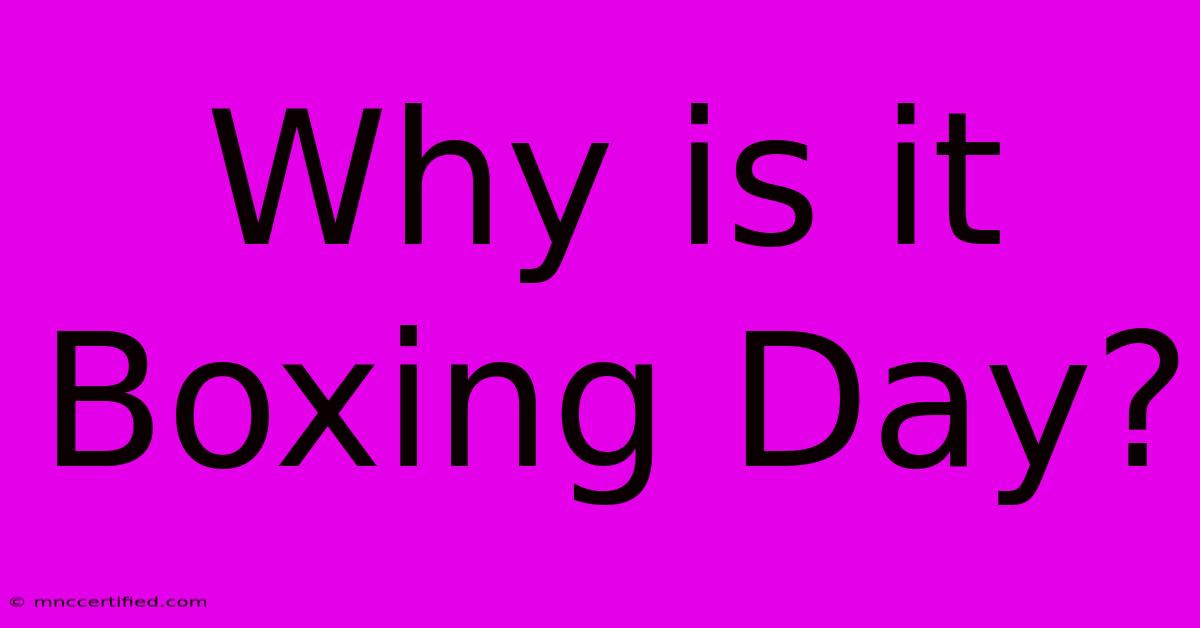Why Is It Boxing Day?

Table of Contents
Why is it Boxing Day? Unboxing the History of This Festive Holiday
Boxing Day, celebrated annually on December 26th, is a public holiday in many countries, particularly those within the Commonwealth. But why is it called Boxing Day? The origins aren't as straightforward as you might think, and the answer is steeped in history and evolving traditions. This post will delve into the various theories surrounding the name and the rich history of this unique holiday.
The Leading Theories Behind the Name "Boxing Day"
Several theories attempt to explain the origins of the name "Boxing Day." While no single theory is definitively proven, the most widely accepted ones center around charitable giving and the practice of tipping servants:
1. Alms Boxes and Charitable Giving:
One prominent theory connects Boxing Day to the medieval practice of placing alms boxes in churches. These boxes would be filled with donations throughout the year, and on December 26th, they would be opened, and the contents distributed to the poor and needy. This act of charity aligns with the festive spirit of the season and provides a plausible link to the name "Boxing Day," where "boxes" refer to these charitable donation containers. This theory emphasizes the holiday's historical roots in acts of generosity and community support.
2. Tipping Servants and Delivery Personnel:
Another widely accepted theory focuses on the tradition of giving gifts, or "Christmas boxes," to servants and delivery personnel. After Christmas Day's festivities, employers would present their servants with a box containing gifts, bonuses, and sometimes leftover food. This practice was common among the wealthy and aristocratic classes. The "boxes" in this context represented the containers holding these gifts, giving rise to the name "Boxing Day." This perspective highlights the social hierarchy and customary practices of a bygone era.
3. Tradespeople and Their Boxes:
A less prominent but still considered theory suggests that tradespeople, such as butchers and bakers, would deliver their goods in boxes and receive their Christmas "boxes" – payments for their services – on December 26th. This aligns with the post-Christmas period when the festivities calmed, allowing for settling accounts and recognizing the contributions of those who worked during the busy holiday season.
The Evolution of Boxing Day Traditions
Regardless of its precise origin, Boxing Day has evolved over time, retaining its connection to generosity but adapting to modern society. While the practice of giving "Christmas boxes" to servants is largely obsolete, the spirit of giving remains. Many people continue to donate to charities, volunteer their time, or participate in community initiatives on Boxing Day. The holiday has become a symbol of community spirit and acts of kindness.
Moreover, Boxing Day has also developed into a day of festive gatherings, sporting events, and family time. In many countries, it's an opportunity for families to continue the Christmas celebrations, often involving relaxed social events and sporting matches. This blend of traditional values and modern practices underscores the holiday's enduring appeal and adaptability.
Boxing Day Around the World
The celebration of Boxing Day varies across different countries. While many Commonwealth nations observe it as a public holiday, the traditions and significance can differ considerably. Some countries focus more on charitable giving, while others prioritize family gatherings and sporting events. Understanding these regional variations helps to appreciate the global scope and diverse interpretations of this unique holiday.
Conclusion: Unpacking the Mystery of Boxing Day
The exact etymology of "Boxing Day" may remain somewhat obscure, but the various theories provide fascinating insights into the holiday's historical and social context. Whether its origins lie in charitable giving, tipping servants, or the settlement of tradespeople's accounts, Boxing Day continues to evolve, retaining its focus on generosity, community spirit, and festive celebrations. The enduring popularity of Boxing Day speaks volumes about its ability to adapt and remain relevant in a constantly changing world. Its continued observance worldwide is a testament to its rich history and meaningful traditions.

Thank you for visiting our website wich cover about Why Is It Boxing Day?. We hope the information provided has been useful to you. Feel free to contact us if you have any questions or need further assistance. See you next time and dont miss to bookmark.
Featured Posts
-
Wordle 1287 Hint December 27 2024
Dec 27, 2024
-
Stream Wolves Vs Manchester United Where To
Dec 27, 2024
-
2024 Rate Bowl Kansas State Vs Rutgers Odds And Line
Dec 27, 2024
-
Hs Title Lions Deal For Bridgewater
Dec 27, 2024
-
Outnumbered 2024 Christmas Special Cast List
Dec 27, 2024